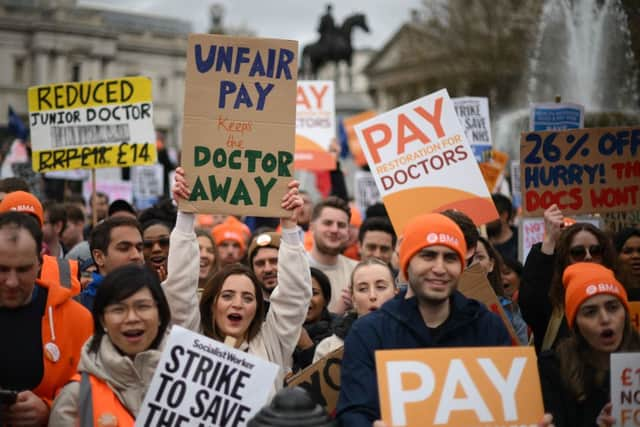Junior doctors’ strike: Medical chiefs call for third party to help broker pay deal with government
and live on Freeview channel 276
An independent organisation should be brought in to help broker a deal in the ongoing pay dispute between junior doctors and the government, medical chiefs say.
The Academy of Medical Royal Colleges has urged both parties to “rapidly engage” with a third party to help break the deadlock in negotiations “for the sake of patients and the wider NHS”.
Advertisement
Hide AdAdvertisement
Hide AdIt comes after almost 200,000 hospital appointments and procedures in England had to be rescheduled when tens of thousands of junior doctors staged a 96-hour strike from 11 to 15 April, which saw an average of 26,145 staff walk out per day.
A total of 20,470 inpatient procedures were forced to be rescheduled as a result of the action, as well as 175,755 outpatient appointments – making a total of 196,225, NHS England data shows.


In a statement on Wednesday night, the medical leaders said the Academy was concerned a solution had not yet been reached and worried about the anticipated impact on NHS services and patients.
The medical chiefs said: “All colleges are keenly aware of the concerns and frustration of doctors throughout the NHS and the intense workload pressures they, along with other NHS professionals, are facing as a result of workforce shortages and as a legacy of the Covid-19 pandemic.
Advertisement
Hide AdAdvertisement
Hide Ad“These are issues which do need to be addressed as a matter of urgency and junior doctors have the support of the Academy and their own colleges in doing this. We urge both parties to engage swiftly and to enter negotiations with a commitment to work constructively and to offer flexibility.
“To this end both parties need to rapidly engage with an independent organisation to work out how the deadlock can be broken for the sake of patients and the wider NHS.”
NHS national medical director Professor Sir Stephen Powis has said the strikes were having a “colossal impact” on planned care in the NHS, and staff now have “an immense amount of work to catch up on”.
He said: “Each of the 195,000 appointments postponed has an impact on the lives of individuals and their families and creates further pressure on services and on a tired workforce – and this is likely to be an underestimate of the impact as some areas provisionally avoided scheduling appointments for these strike days.
Advertisement
Hide AdAdvertisement
Hide Ad“Our staff now have an immense amount of work to catch up on hundreds of thousands of appointments, all while continuing to make progress on tackling the backlog of people who have been waiting the longest for treatment. We have now seen nearly half a million appointments rescheduled over the last five months, and with each strike, it becomes harder.
“While our staff are doing all they possibly can to manage the disruption, it is becoming increasingly difficult and the impact on patients and staff will unfortunately continue to worsen.”
The British Medical Association (BMA) union has demanded a 35% pay rise for junior doctors to bring salaries back to 2008-2009 levels. But this demand has been branded “unreasonable” by Health Secretary Steve Barclay, who accused junior doctors of taking a "militant stance" and timing a four-day strike after the bank holiday to cause “maximum disruption” for patients.
Comment Guidelines
National World encourages reader discussion on our stories. User feedback, insights and back-and-forth exchanges add a rich layer of context to reporting. Please review our Community Guidelines before commenting.
